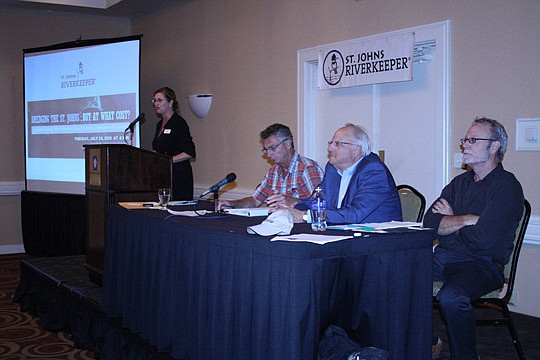
Staff at the U.S. Army Corps of Engineers Jacksonville District stated Tuesday it would pursue more time for public comment on the Jacksonville Harbor Deepening Study, but its current findings likely will cause a reduction in the mitigation funding of the project.
The information was released hours before the St. Johns Riverkeeper held its "Dredging the St. Johns: But at What Cost?" forum at 6 p.m. Tuesday.
St. Johns Riverkeeper Lisa Rinaman asked for more time for public comment on modeling and studies on the effects of harbor deepening that had not been completed and were not subject to public review.
She listed ongoing studies such as ecological modeling, tributary study, groundwater modeling and ship wake simulation.
"We don't expect the results of those modeling efforts to be fully complete until August and we recognize there is a large concern on the part of the general public and some of the agencies that want to see the information," said Eric Suma, environmental branch chief of the Jacksonville District.
"We have been trying really hard to work within the compressed schedule that we've been provided to find room to share that information with the public, receive their comments, put those comments in the report and actually respond to those comments," said Suma.
The Jacksonville District has sent a request to its headquarters to allow public comment during the state and agency review period.
The 30-day window of time begins Jan. 25 and concludes at the end of February, said Jason Harrah, Jacksonville District project manager.
"We believe we can meet the schedule we've been provided and allow the public to see
the latest information," said Suma.
Rinaman spoke to an audience of about 100 attendees at the forum Downtown at the Wyndham Jacksonville Riverwalk.
"We are very concerned because of the fast-tracking of this project. We hear the Corps saying they can do it in their timeline and give us more time, but that remains to be seen," said Rinaman.
The fast-tracking was included in President Barack Obama's "We Can't Wait" initiative in July 2012 that recognized the harbor deepening project as a key infrastructure project for the nation.
The White House Office of Management and Budget was charged with overseeing a government-wide effort to streamline the permitting and review process for infrastructure projects.
The Jacksonville project was expected to be shortened by 14 months.
The Corps also talked about the likely reduction of the estimated $80 million in mitigation funds originally included in the study because it found that deepening the river would cause little damage to the waterway.
"We put out the draft report before the (salinity) modeling was completed, so we had to make a conservative estimate of what the impact would be as a result of the deepening," said Suma.
That estimate appears to be higher than what the mitigation efforts will require, according to the Corps.
"It's more than likely that the figure will come down," said Harrah.
"That will not be a decision that's made just here in Jacksonville. That's something that will be reviewed as part of the final report," said Eric Bush, District chief of the planning and policy division of the Corps.
Proposed uses of the mitigation funds include the creation
of a water quality monitoring plan, purchase of conservation lands and wetlands credits, funding of Timucuan management and analysis, Florida Fish and Wildlife Conservation Commission Habit Management programs and nutrient reduction projects.
Quinton White, executive director of Jacksonville University's Marine Science Research Institute and speaker at the forum, was not satisfied with the Corps' mitigation efforts.
"It is very difficult to mitigate salinity changes. I feel this is a shallow, not very honest approach to what is going on," said White.
The next conference call on the progress of the study is scheduled 10 a.m. Aug. 5.
To participate, call (977) 336-1280 and input access code 7256138.
@photojoe71
(904) 356-2466